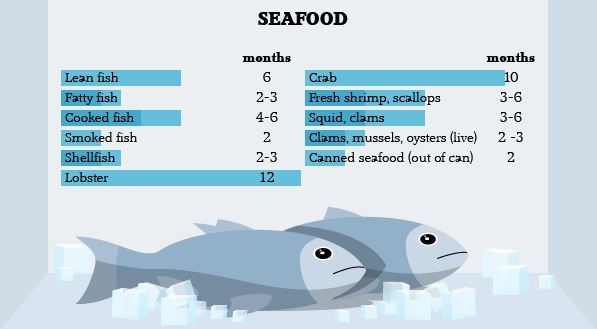Fish can be safely frozen for up to 1-2 months. However, it is important to note that the quality and taste of the fish may deteriorate the longer it is frozen. It is recommended to consume frozen fish within this time frame for the best quality.
Know More About: how long can you freeze fish
When it comes to preserving the freshness and flavor of fish, freezing is a common and efficient method. Freezing not only extends the shelf life of fish but also helps to maintain its nutritional content. Many people wonder how long fish can be safely frozen while still retaining its quality. In this article, we will explore the factors that influence the duration of frozen fish and provide some practical tips for freezing fish at home.
The quality and longevity of frozen fish greatly depend on the type of fish, its initial state, and how well it is prepared for freezing. Generally, most fish can be kept frozen for up to six months without significant deterioration in taste and texture.
To ensure the best results, it is important to freeze the fish as soon as possible after catching or purchasing. This allows you to preserve its freshness and flavor at its peak. If you plan to freeze fish, it is crucial to gut and clean it thoroughly to remove any impurities that may cause spoilage.
Proper packaging is a key aspect of freezing fish. The packaging should be airtight and designed to prevent freezer burn. Freezer-safe plastic bags or vacuum-sealed packages are commonly used for this purpose. By removing as much air as possible from the packaging, you can reduce the risk of oxidation and preserve the quality of the fish.
The storage temperature is paramount in maintaining the quality of frozen fish. The optimal temperature for storing fish in a freezer is below 0 degrees Fahrenheit (-18 degrees Celsius). It is important to set your freezer to these low temperatures and ensure a consistent cooling environment. Frequent changes in temperature or fluctuations can lead to the growth of bacteria, affecting the quality of the fish.
Fish undergoes freezing and thawing processes that impact its texture. To minimize the negative effects of freezing, it is recommended to freeze the fish in portions or fillets, rather than freezing it as a whole. Smaller portions freeze more quickly and evenly, resulting in less damage to the fish’s cell structure. Additionally, it allows for more convenient usage, as you can thaw only the required amount, reducing waste.
Thawing frozen fish correctly is just as important as freezing it. It is strongly advised to thaw fish in the refrigerator rather than at room temperature. Slow thawing in the refrigerator helps retain the fish’s moisture and prevents the growth of bacteria. To thaw, simply transfer the frozen fish from the freezer to the refrigerator and allow it to defrost overnight or for several hours before cooking.
Although frozen fish can be stored for up to six months, it is advisable to consume it within three to four months for the best quality. Over time, fish may lose its moisture, resulting in a drier texture and less appealing taste. By using the “first in, first out” principle when storing your frozen fish, you can ensure that you prioritize consuming the older stock before freezing fresher fish.
In summary, freezing fish is an excellent method to preserve its freshness, flavor, and nutritional value. By following proper techniques such as thorough cleaning, suitable packaging, and careful temperature control, you can extend the shelf life of fish up to six months without significant loss in quality. Remember to thaw frozen fish in the refrigerator and consume it within three to four months to enjoy the best taste and texture. Proper freezing techniques will allow you to savor the delights of freshly caught or purchased fish even during its offseason.
FAQs on how long can you freeze fish
1. Can fish be frozen for an extended period of time?
Yes, fish can be safely frozen for several months if properly packaged and stored.
2. How long can you freeze fish?
Fish can be frozen for up to six months without any significant loss of quality if stored at a constant temperature of 0°F (-18°C) or below.
3. What factors affect the freezing longevity of fish?
The freshness of the fish prior to freezing, the packaging method, the storage temperature, and the type of fish can all influence how long it can be frozen.
4. Should fish be frozen right after purchase?
Ideally, fish should be frozen as soon as possible after purchase to maintain its freshness and quality.
5. How should fish be packaged for freezing?
To prevent freezer burn and maintain the taste, fish should be tightly wrapped in plastic wrap or placed in airtight freezer bags before storing in the freezer.
6. Can previously frozen fish be refrozen?
It is generally not recommended to refreeze fish that has already been thawed, as it can impact the taste and texture. However, if the fish was thawed properly in the refrigerator, it can be refrozen within a short period.
7. Can freezing affect the taste and texture of fish?
While freezing can alter the texture slightly, if fish is frozen and stored correctly, there should be minimal impact on the taste and quality.
8. How do I know if frozen fish has gone bad?
If fish has an off smell or appears discolored, slimy, or has freezer burn, it is likely spoiled and should be discarded.
9. Can frozen fish be thawed and then refrozen?
It is generally safe to thaw frozen fish in the refrigerator and then refreeze it within one to two days. However, the quality may suffer, so it is best to consume the fish once it has been thawed.
10. Can freezing make fish safe from foodborne illnesses?
Freezing does not kill bacteria or parasites, so it is important to handle fish safely and cook it thoroughly before consuming, regardless of whether it has been frozen or not.

